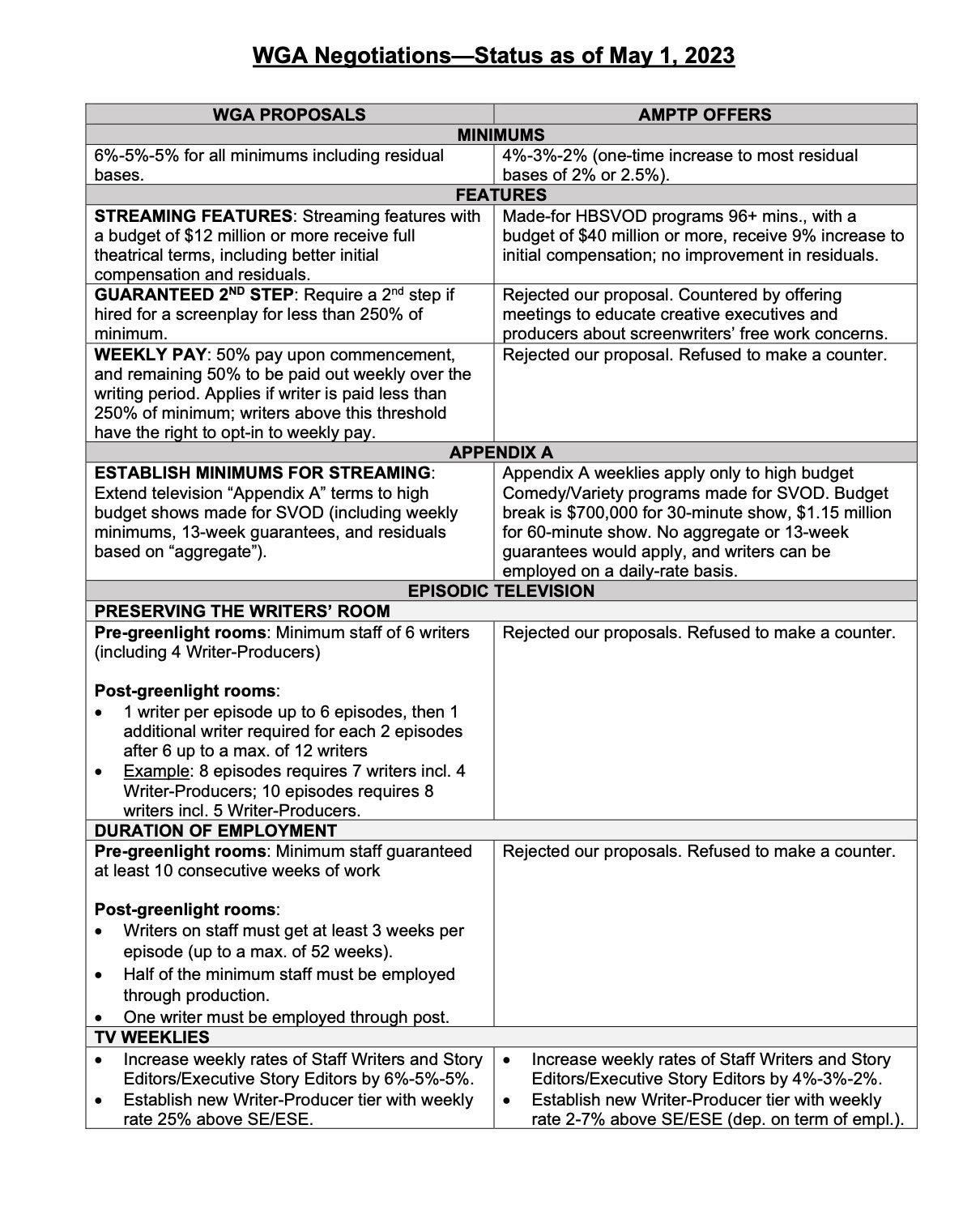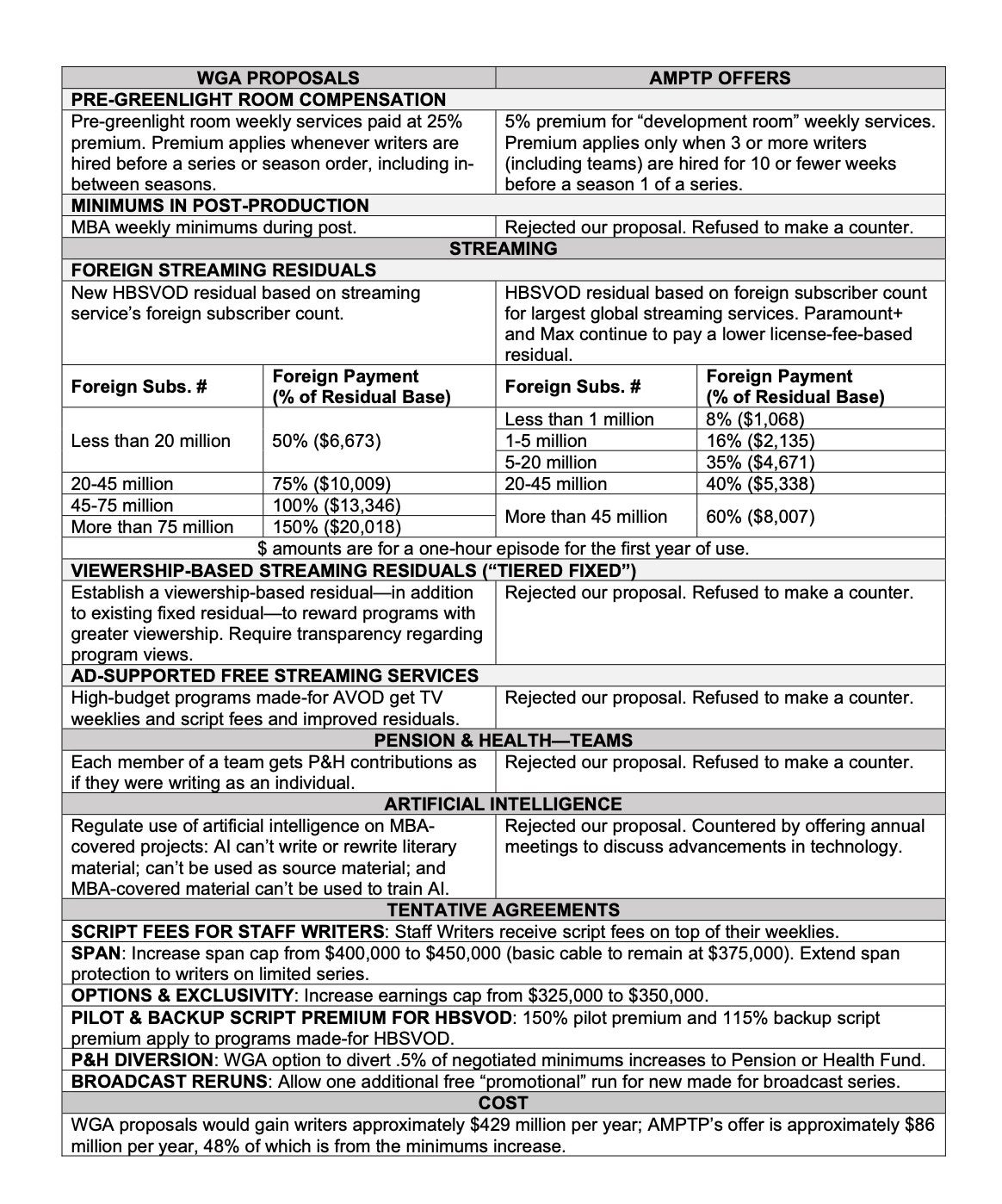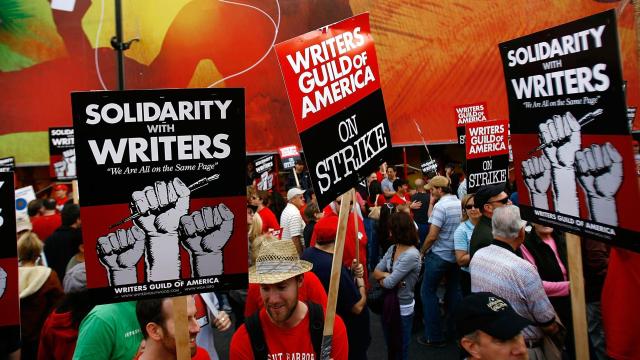The Writers Guild of America (WGA) last night authorised a strike. It has been negotiating with the Alliance of Motion Picture and Television Producers (AMPTP) for better compensation and equity structures and, in mid-April, held a strike authorization vote that saw record numbers of unit members (97.85%) voting yes. The strike went into effect at 12:01 am Pacific Time on Tuesday, May 2 after negotiations failed.
The WGA represents nearly 12,000 writers working in show business; they write television, films, and other literary works, like scripted podcasts and streaming shows. In mid-April, SAG-AFTRA — the Screen Actors Guild — issued a statement of support for the WGA.
What Is The WGA Strike About?
In the age of streaming, one of the main sources of income for writers — residuals — in “new media” formats has almost completely disappeared. Residual income in television comes from shows and movies when they are rerun after airing, released online or via DVDs and Blu-rays, or syndicated via a network. Residuals have faced a steady decline over the past decade, especially for television writers, compounded by streaming services who — on average — pay out lower than network residuals. The removal of shows from streaming services entirely means that no residuals are paid out at all. What used to be a cornerstone of writers’ incomes has turned into an unsafe and unsustainable gamble.
Additionally, like many industries, film and TV writers are still relatively constrained to a couple key locations: Los Angeles and New York City, which are not exactly the cheapest places to live. According to the WGA, more and more writers are working at the minimum salary requirement for their positions. Compounded with a lack of upward movement in the industry, and the fact that jobs come with no guarantees for longevity or stability, many writers live precariously, paycheck to paycheck, in expensive cities with little hope of establishing themselves.
What Are the WGA’s Demands?
The WGA has focused on a “pattern of demands” to address these inequalities and difficulties. A pattern of demand is a set of demands that the union representatives will push for during negotiations, which have been voted on by the larger organisation unit. According to the WGA site, these demands include increasing minimum compensation, expanding protections to cover all television writers, and increasing residuals for “under-compensated reuse markets.”
More generally, the WGA is asking for better professional standards and protections for writers who are employed within the industry. These include regulations for AI and dataset-trained technology, stronger regulation of options and exclusivity clauses in contracts for TV writers, and enacting measures to combat discrimination and harassment.
Ultimately the demands are an existential ask for writers — this strike stands in between writing for a living and writing turning into a gig economy. The ask from the writers would increase guild compensation by 500 million dollars — a far lower sum than the billions that studios and streamers make every year, and less than is spent on shows like Game of Thrones, Stranger Things, Citadel, and Rings of Power. You can read the full list of demands here and read the proposals/counter proposals, publicly released by the WGA along with the announcement of the strike, below.


You can read the WGA proposals and the response from the studios here.
What Happened During the Last Writer’s Strike?
The last writer’s strike happened 15 years ago, in November 2007, and lasted until February 2008. There were similar issues on the table — namely, residuals and what was then called “new media,” which we now call streaming. The WGA successfully laid the groundwork for covering streaming services before Netflix or Amazon got into producing their own content, which meant that when they did, they had to hire Guild writers to do so.
During the strike, the networks almost universally suffered; they all noted a significant drop in viewership, and many networks fired staff in order to compensate for the lack of production work. At that time reality shows and reality television were not covered under the WGA, and many reality shows were ordered at networks. Very few of those shows stuck around. Many showrunners, actors, and late-night hosts vocally supported the strike and marched alongside writers.
What Does the WGA Strike Mean For Sci-Fi and Fantasy?
One source told Variety, “The writers’ concerns are completely and objectively valid, which has the studios and producers a bit more rattled than they’d like to admit.”
The truth is that the strike would have to be protracted before there was any noticeable change in film or television output. The first and hardest hit will be the nighttime talk shows, who will not have writers working, and who will not be able to perform any work that would have been written by a Guild member — and in fact, have already started announcing hiatus plans. Remember when Conan O’Brien literally spun his wedding ring on his desk to take up time rather than attempt to go against the WGA demands?
Regardless, the studios stand to lose a lot of money. Fifteen years ago, estimates ranged widely on the effect of the strike on the bottom line, anywhere from $US300 ($416) to 500 million. According to Bloomberg, the City of Los Angeles lost $US1.5 ($2) billion. What a strike means is that writers across all genres, media, and services are going to stop writing and will refuse to do any kind of work until the union has reached an acceptable agreement. Scott Purdy told Yahoo Finance that “consumers should prepare for some of their favourite TV shows to be delayed and to potentially enter a period where there’s a limited amount of new content to watch.”
Despite the fact that it might take a while for audiences to see the reprecussions on screen, two of the biggest, most expensive shows in television — HBO Max’s House of the Dragon and Amazon’s The Lord of the Rings: The Rings of Power — are currently in production and filming their upcoming seasons. In 2007-2008, showrunners, also known as multi-hyphenate writer-producers, were asked to continue production duties, but many cited their alliance with WGA and refused to continue working and were fired.
There’s also the fact that the strike is occuring during the “For Your Consideration” event schedule for the Emmys. Many shows are doing special FYC events across LA and NYC, and it’s unclear how a strike will affect the FYC campaigns or how writers, showrunners, and actors will respond during a strike when they are supposed to be promoting their work from 2022. While not in the FYC schedule this year, Good Omens is another example of completed work being affected — Neil Gaiman said on Twitter that while the show was “completed and handed in,” he “may not be able to promote it” as he’d hoped.
Although Teamsters and SAG-AFTRA have advised their members to continue to work, they stand with the WGA. However, there are some protections for workers written into both Teamsters and SAG contracted workers who refuse to cross a physical picket line if they would have to do so to get to work.
What Does This Mean for Audiences at Home?
This is a good thing. After the writer’s strike ended in 2008, we got some of the best television we had seen in years — critic Emily St. James notes that the subsequent seasons of Breaking Bad and Mad Men, for example, were some of the best we had ever seen. Other shows like Party Down, Community, and even Kings got their chance to show off on channels that usually wouldn’t have greenlit those projects. Sure, reality television kind of sucked for a while, but none of it lasted very long. And yes, maybe the writer’s strike likely led to the renewal of The Apprentice, which elevated Donald Trump’s profile, which might have led him to run for president in 2016, but who truly knows!
The point here is that writers are on strike because they cannot live under the current conditions. Nobody wants to go on strike — it genuinely sucks. Speaking from experience, it’s stressful and scary and overall not a good time. But this will make Hollywood better. This will make writing better. It will support new talent, give people a chance to establish themselves as writers, and ultimately, it will lead to some absolutely incredible film and television. The world deserves good film and television. And film and television writers deserve to earn a living.
io9 has reached out to the WGA and AMAPT for comment. We will update this story if we receive a comment.
